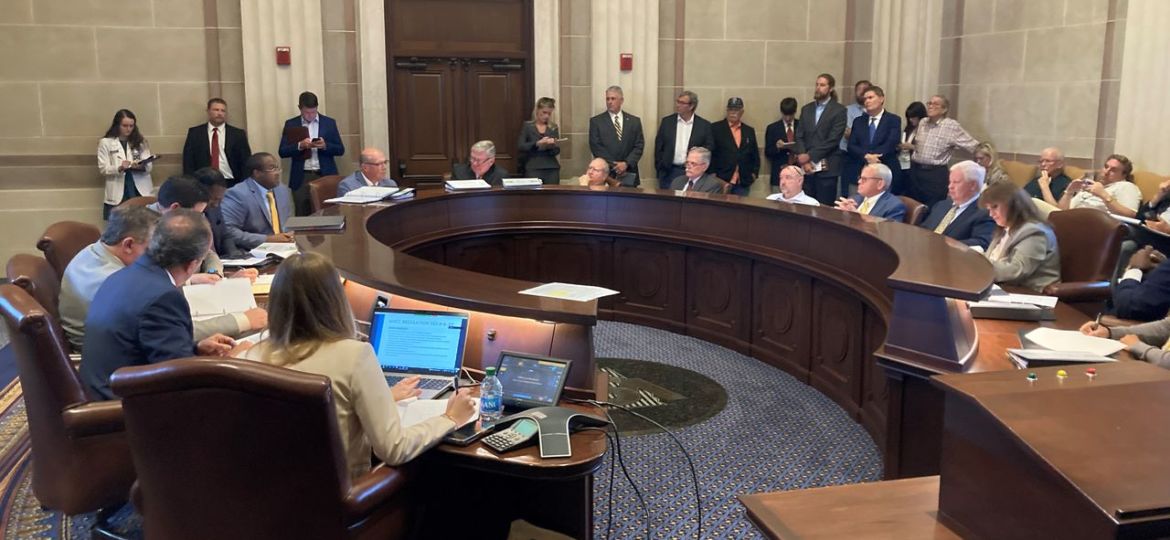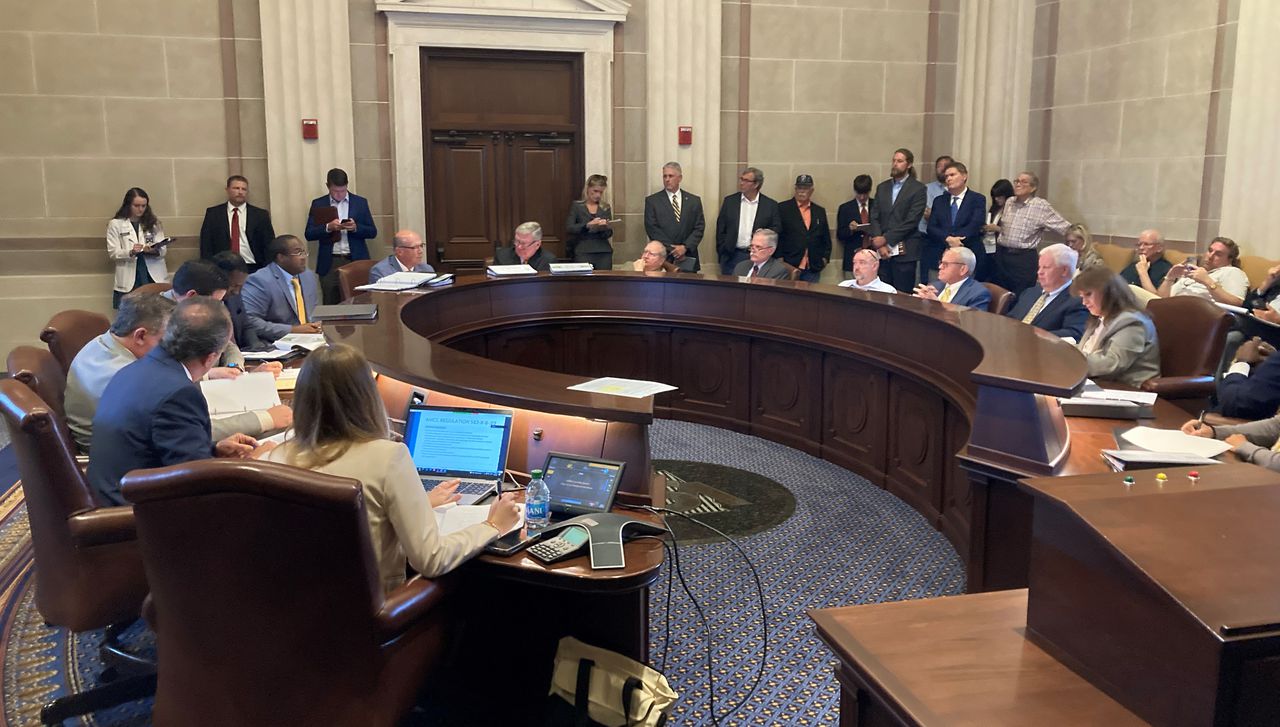

The qualifications of the dispensers who will manage the sales of medical marijuana products in Alabama are still to be determined for the state’s new industry.
In some states, pharmacists dispense medical cannabis products. It’s unclear whether that will be the case in Alabama. Nothing in the law or regulations passed so far indicates that pharmacists will be involved.
Pharmacist Sam Blakemore of Birmingham, a member of the Alabama Medical Cannabis Commission, is spearheading the development of qualifications for certified dispensers.
Blakemore said there is an expanding body of science about medical cannabis and that certified dispensers need a solid base of knowledge even if they are not pharmacists.
“Understanding the science is going to be a big part for these certified dispensers in the foundational education because I want them to understand how this stuff works,” Blakemore said. “Then they’ll be able to give appropriate consultations to the patient and/or be able to refer them back to the physician. So I think the more pharmacology, the more science that these certified dispensers have, the better off everybody is.”
Alabama became the 37th state to legalize medical cannabis when the Legislature approved a bill last year. It will be an intrastate business, with cannabis grown and products made in Alabama. The legislation created the 14-member AMCC for oversight.
On Sept. 1, the AMCC began accepting requests for license applications for cultivators, processors, transporters, testing labs, dispensaries, and integrated companies performing multiple functions. The AMCC expects to issue licenses next summer. Products are expected to be available late next year or in 2024.
Doctors who receive training in medical cannabis will be able to recommend the products to treat more than a dozen symptoms and conditions, such as chronic pain, nausea from chemotherapy, muscle spasticity, depression, and panic disorder. Patients will receive a medical cannabis card to buy the products at licensed dispensaries. Alabama could initially have as many as 37 dispensaries in cities and counties that approve them by resolution or ordinance, a process happening now.
The AMCC has approved regulations for dispensaries and some of the qualifications for the certified dispensers who will manage them. Certified dispensers must have a minimum two years of education or experience in biology, chemistry, pharmacology, medical cannabis, or a similar field. They must complete a foundational course in medical cannabis and receive at least 10 hours of continuing education a year.
Blakemore, pharmacy manager at Peds Rx Pharmacy Solutions, the outpatient pharmacy at Children’s Hospital in Birmingham, is working on what the training course will include. Blakemore has experience in similar work; he created a course for pharmacy technicians at Lawson State Community College and teaches continuing education for pharmacists and pharmacy techs.
Although three-fourths of states have legalized medical cannabis, marijuana remains a Schedule I drug under federal law, the same category as heroin, LSD, and methamphetamine.
The illegal status of marijuana under federal law raises questions for some about involvement in state-approved medical cannabis programs, including concerns from banks about providing services for the industry. Pharmacists in Alabama have concerns.
“There are still so many unanswered questions about this issue,” Leisa Johnson, director of communications and marketing for the Alabama Pharmacy Association, said in an email. “As the professional organization for pharmacists and technicians, we are awaiting guidance from the regulatory board.”
The Alabama Board of Pharmacy has not announced a policy on the involvement of pharmacists in the medical cannabis industry. Jim Ward, the board’s lawyer, said he would respond to questions from AL.com after discussions with the board. Minutes from the board’s meetings say the board has received numerous questions about whether a pharmacist can own a dispensary or dispense medical marijuana.
Blakemore notes that pharmacists have played a role in other states. The Louisiana Board of Pharmacy issues specialty licenses for pharmacies to dispense medical marijuana. Minnesota, New York, and Connecticut are among other states where pharmacists have been involved.
States that allow pharmacists to dispense medical marijuana have generally relied on U.S. Department of Justice guidance issued in 2013 known as the Cole memo, Blakemore said. The memo said the DOJ did not consider taking enforcement action against states a priority as long as states set up tight regulatory structures to prevent abuses of medical cannabis, such as the distribution of marijuana to minors and criminal enterprises profiting from the industry.
The National Community Pharmacy Association issued a one-page summary on the issue of pharmacists and medical cannabis in 2017.
At the Peds Rx pharmacy, Blakemore dispenses two cannabis-based medicines approved by the Food and Drug Administration. He dispenses Marinol for pediatric patients to treat nausea and vomiting caused by chemotherapy. It contains a synthetic form of THC. He dispenses Epidiolex for pediatric patients with epilepsy. It contains cannabidiol, or CBD.
“I’ve seen people benefit by taking those medications,” Blakemore said. “I’ve also had patients that openly told me, ‘I am taking marijuana.’ So I think big picture is we know people use marijuana. We know people use cannabis. Would you prefer that they continue to do so on the black market? Or would you prefer that it be regulated? I’d prefer that it be regulated.”
Blakemore said Sativex, which contains roughly equal parts of THC and CBD, is used in about 30 other countries for Parkinson’s and other motion disorders and has undergone clinical trials in the United States.
The illegal status of marijuana under federal law has limited the research in the United States. But Blakemore said there are good information resources. One is the Minnesota Department of Health’s annual review of medical cannabis studies, last updated in May. Wolters Kluwer is a company that provides research data to medical professionals through Lexicomp and that publishes “Medical Marijuana: A Clinical Handbook.” The University of Mississippi has been a key hub for marijuana research.
Blakemore said certified dispensers need an understanding of the human body’s endocannabinoid system and the properties of cannabis. He said THC and CBD are only two of more than 120 substances known as phytocannabinoids in the plant.
“There’s other chemical structures coming down the pipeline,” said Blakemore, who has a doctorate in pharmacy from Samford University and is a licensed pharmacist in five states. “That’s where the future will be. There is a lot of research that still needs to take place as to how these chemicals can help with disease state management.”
While Blakemore wants dispensers to have a strong foundation in the science, he also wants them to know their limitations, such as when to defer to doctors on questions such as drug interactions.
“There’s language in the rules and regulations that certified dispensers should understand their level of knowledge and they shouldn’t cross it,” Blakemore said. “They should know when to refer a patient back to a physician.”
Licensed medical cannabis dispensaries will be distinct from retail drug stores. Entry will be restricted to patients with medical cannabis cards or registered caregivers. Dispensaries cannot sell to out-of-state residents or deliver. They must have surveillance cameras as part of a cohesive security plan and maintain 60 days of video footage. A certified dispenser and a security guard must be on duty at all times a dispensary is open.
Blakemore said it is important to get the regulations correct and build the trust of the public and the medical community. He compared it to the growth in familiarity and comfort level during the nine years he has managed the Peds Rx pharmacy.
“Going through that process of opening up a pharmacy, trying to build up the patient volume, trying to educate the prescribers on what we do, what services we can provide, that’s the same kind of expectation I have for a lot of these dispensaries,” Blakemore said. “They’re going to have to earn the trust of the community. Education is the only way to do that.”
Blakemore said he is convinced there can be public benefit if the medical cannabis program is set up correctly.
“This product really can help if done right,” Blakemore said. “I think I can speak for the commission members. We’ve dedicated a lot of time to really consider all the factors. We just want to help the citizens of Alabama that are sick and can use the product have a reliable, quality product and have access to it.”

